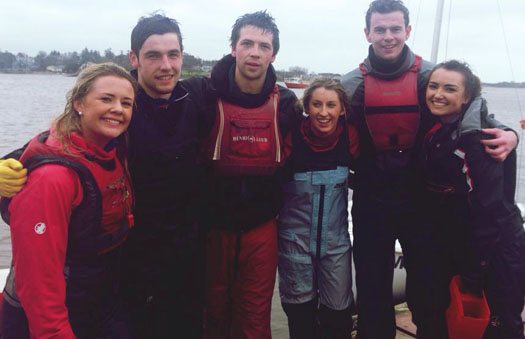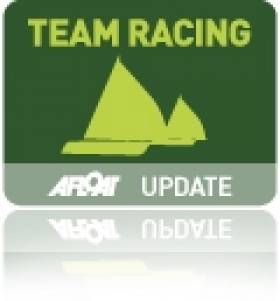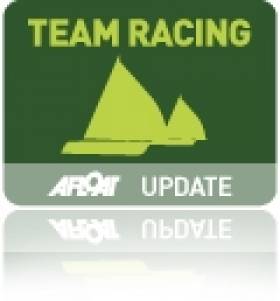Displaying items by tag: Irish University Sailing Association
University Sailors Head for Schull Team Race Championships Hosted By UCC Sailing Club
#varsitysailing – The upcoming Irish University Sailing Association Intervarsity Championships will be hosted by the University College Cork Sailing Club next weekend.
This team racing event will run from the 26th to the 28th of February in the Fastnet Marine Outdoor Education Centre in Schull, Co. Cork. The F.M.O.E.C. is no stranger to events of this calibre, having hosted the Team Racing World Championships in 2011.
28 teams will travel from 9 colleges in Ireland, namely University College Cork, Cork Institute of Technology, University of Limerick, National University of Ireland Galway, University College Dublin, Trinity College Dublin, Dublin City University, Dublin Institute of Technology, and Queens University Belfast. The Scottish University Sailing Association will also be represented by two teams from Loughborough University.
Following day one, teams will be divided into Gold, Silver and Bronze fleets, and will race in these respective fleets on day two. On the third day, the top teams in each fleet will compete in the finals series.
In 2013/2014 the Intervarsity title was won by University College Dublin, with University College Cork finishing in second place, and University of Cork (2) in third position.
UCD Win Irish University Sailing Association Inter-Varsities at Wexford
#teamracing – On the 20th-22nd of February, the Irish University Sailing Association Inter-Varsities Championships took place in Wexford Harbour Boat and Tennis Club. 25 teams from 9 colleges around the country, including 2 teams from Scotland competed for the annual trophy. The team racing took place in Firefly dinghies, with 3 on 3 racing. After a day of racing in random pools, the teams were separated into Gold Silver and Bronze fleets for the second day. Round robins took place on the Friday to decide on the layout of the finals on Saturday.
Early favourites of UL (last year's winners), UCC, Trinity and UCD made the quarter finals, but unfortunately Trinity and UL didn't make it past this stage.UCD1 met UCD3 in the quarter-finals on Saturday, and while UCD's third team put up a good fight against the eventual champions, they lost 2-0 in a best of 3 round. UCD 2 met a very strong UCC2 team, and the Cork side emerged victors, advancing to the semis to face their newest enemies UCC1. TCD met the Scottish representatives SUSA in their quarter final, and in close racing the Scots came out on top. Last year's winners UL faced UCC1 in their quarter-final, but couldn't get past the very strong Cork side.
UCD1 went on to face SUSA in their semi, while a Cork showdown happened in the other half of the draw with UCC 1 and UCC 2. UCD1 won their races 2-0, but the Cork battle was a much more intense affair, with Cork's first team winning 2-1.
The best of 5 final was raced in gusty conditions with storm sails up, and sailors at maximum hike for all the beats. The balcony on the clubhouse facing the racing was split, half UCD and the other UCC, each side shouting for their team. The first race went to UCD in a 1, 2 formation. The second race went to UCC winning with a 1, 2, 6. The third race brought great excitement for the spectators gathered on land with a UCC boat capsizing on the starting line, letting UCD get into a winning formation by the first mark. UCD's lead was strengthened by another UCC boat capsizing on the downwind leg. UCC had a boat in first but he was unable to help his team-mates recover the ground they had lost. The score was 2-1 to UCD. In the 4th race UCC had a good start, and kept a winning combination for the duration of the race, setting up a winner-takes-all final race. Race 5 brought a big lead for UCD as they took first place at the first mark and extended the race. They held this lead while UCC tried to break apart the winning combination around the course. Simon of UCD held his 3rd place and Philip pulled a UCC boat back with him, leaving the fleet spread out on the final leg. Simon kept his 3rd place, and with Conor's 1st, this was enough to crown UCD1 winners of the 2014 Varsities. It was Simon's 4th Varsities final, and younger brother Philip's first, a fitting passing of the torch.

The winning UCD team celebrate their Varsity title
The winning UCD team was Simon Doran & Jen Dolan, Philip Doran & Bella Morehead and Conor Murphy & Eimear McIvor. UCC2 won their petite final to come 3rd, a very strong finish for UCC in 2nd and 3rd place. SUSA 2 were Silver fleet champions, beating UCD 4 in their close final. Bronze fleet glory went to TCD 2. The college team racing circuit is one of the most active and competitive groups in the country, with many of Ireland's top student sailors representing their colleges there.
The college team racing circuit is now finished for the year, with the exception of the annual Colours races between UCD and Trinity which will be held in April. The students now look to the Student Yachting Nationals over the next few weeks, the winners of which will qualify to represent Ireland at the Student Yachting World Cup in France next Autumn.































































